Can someone please help me tune this SQL query?
SELECT a.BuildingID, a.ApplicantID, a.ACH, a.Address, a.Age, a.AgentID, a.AmenityFee, a.ApartmentID, a.Applied, a.AptStatus, a.BikeLocation, a.BikeRent, a.Children,
a.CurrentResidence, a.Email, a.Employer, a.FamilyStatus, a.HCMembers, a.HCPayment, a.Income, a.Industry, a.Name, a.OccupancyTimeframe, a.OnSiteID,
a.Other, a.ParkingFee, a.Pets, a.PetFee, a.Phone, a.Source, a.StorageLocation, a.StorageRent, a.TenantSigned, a.WasherDryer, a.WasherRent, a.WorkLocation,
a.WorkPhone, a.CreationDate, a.CreatedBy, a.LastUpdated, a.UpdatedBy
FROM dbo.NPapplicants AS a INNER JOIN
dbo.NPapartments AS apt ON a.BuildingID = apt.BuildingID AND a.ApartmentID = apt.ApartmentID
WHERE (apt.Offline = 0)
AND (apt.MA = 'M')
.
Here's what the Execution Plan looks like:
.

What I don't understand is why I'm getting a Index Scan for NPapplicants. I have an Index that covers BuildingID and ApartmentID. Shouldn't that be used?